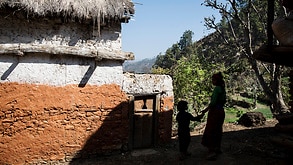...This is why we do what we do - SBS News Asia Pacific
A woman and two children have died in a Nepalese menstruation hut

A chhaupadi hut in western Nepal. Source: Tara Todras-Whitehill/The New York Times
In Nepal, many women leave their homes during their periods
and sequester themselves in closet-size huts made of mud or rock.
by Bhadra Sharma and Kai Schultz © 2018 New York Times
When Amba Bohara’s period came this week,
she followed a familiar routine in western Nepal. Considered impure in her
village because she was menstruating, Ms Bohara barricaded herself in a tiny
hut, built a fire and braced for an icy winter night with her two young
children.
By Wednesday morning, all three were dead.
“It seems they died from suffocation,” said
Uddhab Singh Bhat, the deputy superintendent of police in the area. “The hut
was so small. It was very difficult to breathe.”
Ms Bohara and her children were the latest
victims of a centuries-old tradition of banishing menstruating women and girls
from their family homes. Though Nepal criminalised the practice last year, many
villages in the country continue to follow the taboo, known as chhaupadi in Nepali.
During their periods, women living in
places where chhaupadi is followed are unable to visit temples, use other
villagers’ kitchen utensils or wash in communal water sources. Some religious
Hindus consider it bad luck to touch menstruating women and girls.
Instead, they leave their homes and
sequester themselves in closet-size huts made of mud or rock, sometimes
sleeping next to goats.
Each year, at least one or two women die in
the huts — typically from exposure, animal bites or smoke inhalation after building
fires to stay warm during the Himalayan winters. Reports of sexual assault from
men who prey on women while they stay alone are also common.
Many women who follow chhaupadi say they do
so out of social pressure or guilt.
A Nepali government survey from 2010, which
was cited in a State Department human rights report, found that 19 per cent of
women aged 15-49 in the country followed chhaupadi. In Nepal’s midwestern and
far western regions, the proportion climbed to 50 per cent.
Nepal’s Supreme Court banned the practice
in 2005, and last August the government went a step further by criminalising
it. Anyone who forces menstruating women into the huts now faces up to three
months in jail.
But women’s rights activists say the law
has had little effect, particularly in western Nepal, one of the poorest
pockets of Asia, where it is still politically unpopular for local
representatives to oppose the taboo. So far, no one has been charged for
following chhaupadi.
“The situation is miserable,” said Mohna
Ansari, a member of the National Human Rights Commission of Nepal. “It seems
nothing is changing.”
In a telephone interview, Khadak Bahadur
Bohara sobbed as he related what happened this week to Ms Bohara, his
35-year-old sister-in-law.
On Tuesday evening, the second day of her
period, she fed her family’s cattle in the village of Budhinanda and collected
wood to build a fire in the hut.
With her husband working as a manual
labourer in India, Ms Bohara also scooped up her two children, Suresh, 9, and
Ramit, 7, and shut them inside the hut with her.
Amba Bohara placed a large stone in front
of the door to block others from entering.
The next morning, when her mother-in-law
brought cups of tea to the hut, she saw smoke seeping out from cracks in the
walls. Relatives struggled to break the door. Once inside, they found a
gruesome scene: Bohara’s legs were charred. Foam bubbled out from the
children’s mouths.
“This has broken my heart,” Khadak Bohara
said of the three deaths.
In interviews, senior police officials said
they were investigating and would decide whether any charges would be applied
after autopsies were performed and the woman’s husband was contacted.
Rewati Raman Bhandari, a former lawmaker
who drafted the measure that criminalised chhaupadi, said the push to eradicate
the practice — from villagers, the police and local politicians — was still far
too muted.
“Tradition is stronger than the law,” he
said.
